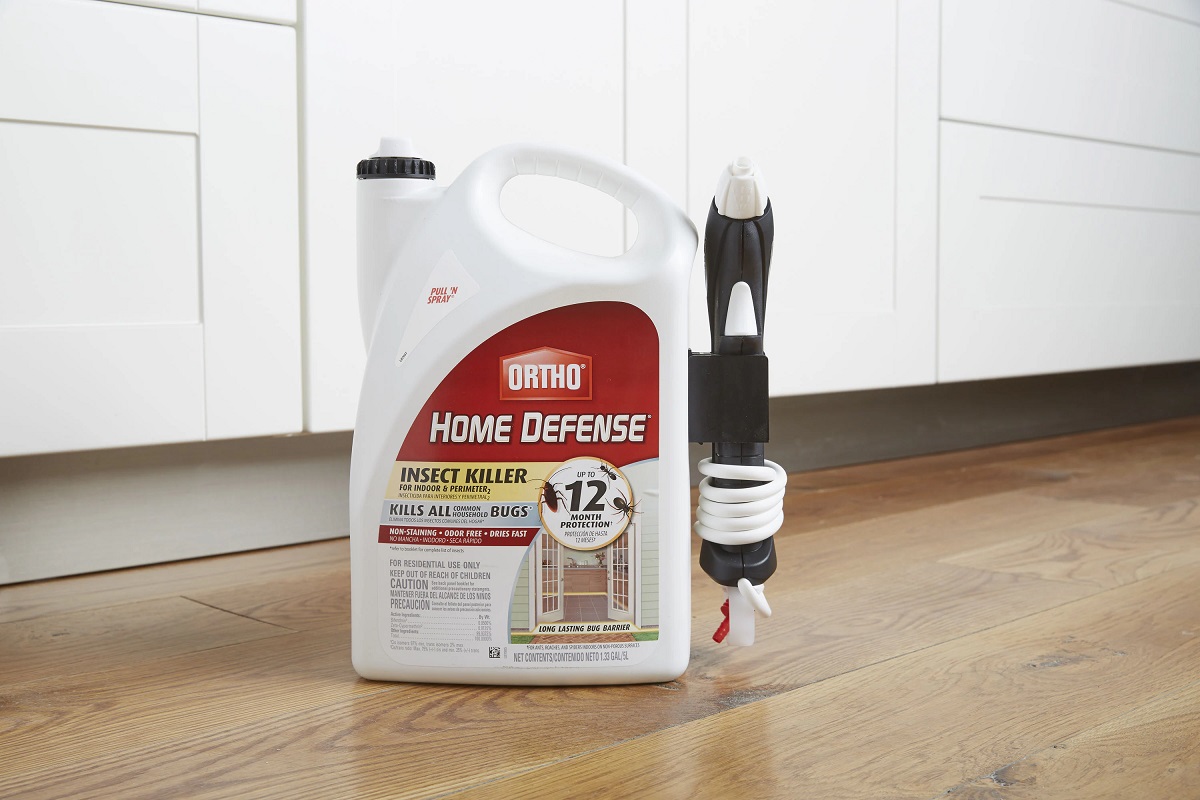Home>Home Security and Surveillance>What Are The Laws Concerning Home Defense In Ohio


Home Security and Surveillance
What Are The Laws Concerning Home Defense In Ohio
Modified: March 6, 2024
Learn about the laws concerning home defense in Ohio, including important information on home security and surveillance. Stay protected with the right knowledge and measures.
(Many of the links in this article redirect to a specific reviewed product. Your purchase of these products through affiliate links helps to generate commission for Storables.com, at no extra cost. Learn more)
Introduction
Welcome to the world of home security and surveillance! In today’s ever-changing society, securing our homes and ensuring the safety of our loved ones has become a top priority. With the advancements in technology, there are now various options available for home security systems and surveillance cameras that can provide peace of mind and a sense of protection.
However, it’s not just about the equipment and gadgets; it’s also crucial to understand the laws surrounding home defense in your state. This knowledge can help you make informed decisions and stay within the boundaries of the law while ensuring the safety of your home and family.
In this article, we will shed light on the laws concerning home defense in Ohio. Understanding these laws will empower you to protect your home while acting responsibly and within the legal framework.
Ohio, like many other states, has specific laws that govern individuals’ rights to defend their homes from intruders or potential threats. These laws ensure that homeowners have the necessary legal protection if they find themselves in a situation that requires self-defense.
It is essential to note that while we strive to provide accurate and up-to-date information, it is always crucial to consult with a legal expert to fully understand the laws in your specific area. With that said, let’s dive into the key laws concerning home defense in Ohio.
Key Takeaways:
- Ohio’s Castle Doctrine allows individuals to use force, including deadly force, to protect themselves and others within their homes without the obligation to retreat, ensuring a sense of safety and security.
- Understanding Ohio’s self-defense laws is crucial to protect your home and loved ones. It emphasizes reasonable belief, proportionality, and avoiding unnecessary harm, ensuring responsible and lawful actions in home defense situations.
Castle Doctrine in Ohio
In Ohio, the Castle Doctrine is a vital component of the state’s home defense laws. Under the Castle Doctrine, individuals have the right to use force, including deadly force if necessary, to protect themselves and others within their home.
This doctrine operates under the presumption that a person’s home is their castle, where they should feel safe and secure from harm. The Castle Doctrine removes the legal obligation to retreat from an intruder before using force, providing individuals with the ability to stand their ground and defend their home.
However, it is important to understand that the Castle Doctrine applies within the confines of one’s home or dwelling. If an individual uses force or deadly force outside their home, the Castle Doctrine may not offer the same legal protections.
It is also crucial to note that the use of force under the Castle Doctrine is only justified if the homeowner reasonably believes there is an imminent threat of unlawful force or harm. This means that the homeowner must have a genuine reason to believe that they or someone else is in danger.
In Ohio, the Castle Doctrine serves as a strong legal defense for individuals who use force to protect themselves and their homes from intruders. However, it is essential to remember that the application of the Castle Doctrine may vary depending on the specific circumstances of each case, and consulting with a legal expert is always advisable.
Now that we’ve covered the Castle Doctrine, let’s explore another crucial aspect of home defense law in Ohio: the Stand Your Ground Law.
Stand Your Ground Law in Ohio
In Ohio, the Stand Your Ground Law is another important legal principle that applies to home defense situations. This law allows individuals to use reasonable force, including deadly force, to defend themselves or others without the obligation to retreat.
Under the Stand Your Ground Law, individuals have the right to stand their ground and defend themselves if they believe they are facing an imminent threat of death, serious physical harm, kidnapping, or sexual assault. This means that individuals do not have a legal duty to retreat before using force in self-defense, even if it would be possible to do so safely.
This law emphasizes an individual’s right to protect themselves and their loved ones from harm without the fear of legal consequences for not retreating. However, it is important to note that the law applies only under specific circumstances and requires that the belief of an imminent threat be reasonable.
It is crucial to remember that the Stand Your Ground Law is not an open invitation for individuals to use force indiscriminately. The use of force must always be proportionate to the threat faced, and it must be a reasonable response given the circumstances.
In Ohio, the Stand Your Ground Law is a legal safeguard that allows individuals to exercise their right to self-defense without the legal obligation to retreat. However, it is important to apply this law responsibly and in accordance with the specific circumstances of each situation to avoid any potential legal complications.
Now that we understand the Stand Your Ground Law, let’s delve into the self-defense laws in Ohio, which provide further guidance on how individuals can protect themselves and their homes within the boundaries of the law.
Self-Defense Laws in Ohio
When it comes to self-defense, Ohio has specific laws that outline the rights and limitations of individuals in protecting themselves and their homes. Understanding these laws is crucial to ensure that you act lawfully while defending yourself in a home defense situation.
In Ohio, the law recognizes the inherent right to self-defense. This means that individuals have the right to use force, including deadly force, to defend themselves when they reasonably believe they are in imminent danger of death or serious bodily harm.
However, it is important to note that the use of force must be necessary and proportionate to the threat faced. This means that you should use the minimum force required to protect yourself or others. Excessive or unnecessary force could potentially lead to legal consequences.
Ohio’s self-defense laws also emphasize the importance of assessing the situation from a reasonable person’s perspective. This means that your belief that you are in immediate danger must be objectively reasonable, considering the circumstances at hand.
It is worth noting that self-defense laws may apply not only to the protection of oneself but also to the defense of others. If you reasonably believe that another person is in imminent danger of death or serious physical harm, you may use force, including deadly force, to protect them.
While Ohio permits the use of deadly force in self-defense, it is important to understand that this authorization is not unlimited. If you can safely retreat or avoid the confrontation without endangering yourself or others, you may be obligated to do so.
Next, let’s explore the use of deadly force in home defense situations and the specific considerations you should keep in mind.
Use of Deadly Force in Ohio
The use of deadly force is a serious matter and should be approached with caution and understanding of the laws surrounding it. In Ohio, the use of deadly force is permissible under specific circumstances outlined by the state’s self-defense laws.
Ohio law allows the use of deadly force if an individual reasonably believes that it is necessary to protect themselves or others from imminent death or great bodily harm. This means that if you genuinely believe that your life or the life of another person is in immediate danger, you may use deadly force as a means of self-defense.
It is crucial to remember that the use of deadly force should always be a last resort. You must exhaust all other reasonable means to resolve the situation or escape harm before resorting to such extreme measures.
Additionally, Ohio law mandates that you must not be the aggressor in the incident. If you provoke or initiate the confrontation, the use of deadly force may not be justified under the state’s self-defense laws.
Furthermore, it is essential to consider the concept of proportionality when it comes to the use of deadly force. The force used must reasonably correspond to the perceived threat. This means that you should only use as much force as is necessary to neutralize the threat and protect yourself or others.
Ohio law also recognizes the privilege of dwelling, which provides individuals with additional legal protections when defending their homes. If you reasonably believe that you or someone else in your home is facing imminent danger of death or great bodily harm, and you are lawfully present in the dwelling, the use of deadly force may be justifiable.
However, it is important to emphasize that the application of the use of deadly force in home defense situations can be complex, and the specific circumstances of each case will be carefully considered. Consulting with a legal expert is advisable to fully understand the implications of using deadly force in your specific situation.
Next, let’s explore the concept of duty to retreat and how it applies to home defense in Ohio.
In Ohio, you have the right to defend your home with force if you reasonably believe it’s necessary to prevent a violent intrusion. However, it’s important to understand the specific laws and regulations regarding home defense in your state.
Read more: What Is The Law On Security Cameras
Duty to Retreat in Ohio
While Ohio recognizes the rights of individuals to defend themselves and their homes, it also imposes certain limitations, including the concept of duty to retreat. The duty to retreat refers to the obligation to avoid confrontation or to seek a safe way to remove oneself from a dangerous situation before resorting to the use of force.
Unlike some states that have “Stand Your Ground” laws, Ohio requires individuals to consider the option of retreating before using force, including deadly force, in self-defense. This means that if you can safely and reasonably escape the threat without putting yourself or others in further danger, you should do so.
However, it is important to note that the duty to retreat does not apply if you are in your own home or dwelling. In such cases, Ohio’s Castle Doctrine comes into play, allowing individuals to stand their ground and use force, including deadly force, to defend themselves without the obligation to retreat.
Additionally, the duty to retreat also does not apply if you are in a place where you have a legal right to be, such as a public space or your workplace. In these situations, the focus shifts to whether the use of force was necessary and justified given the circumstances.
It is crucial to understand that the duty to retreat may vary depending on the specific circumstances of each case. If a person has a reasonable belief that retreat would result in danger or harm, then they may be justified in using force to protect themselves or others.
Ultimately, the duty to retreat is a balancing act between the right to self-defense and the responsibility to avoid unnecessary harm. It is important to remember that the use of force, even in self-defense, should always be the last resort after exhausting all other reasonable options.
Now, let’s explore the various factors considered in home defense cases in Ohio, which can significantly impact the outcome and legal implications.
Factors Considered in Home Defense Cases in Ohio
When it comes to home defense cases in Ohio, several factors are taken into consideration to determine the lawfulness of an individual’s actions. These factors play a crucial role in assessing the reasonableness and justification of the use of force in self-defense. Understanding these factors can help individuals navigate the legal landscape surrounding home defense in Ohio.
1. Imminent Threat: One of the key factors considered is whether there was an imminent threat of death or serious bodily harm. If a person reasonably believes that they or someone else was facing immediate danger, it strengthens their claim of self-defense.
2. Proportional Response: The degree of force used in self-defense is carefully evaluated. The force employed must be reasonably proportional to the threat faced. Using excessive force beyond what is necessary to neutralize the danger may negate the claim of self-defense.
3. Reasonable Belief: The reasonableness of an individual’s belief in the existence of a threat is crucial. The circumstances and the information available to the person at the time are considered in evaluating whether their belief was reasonable.
4. Aggressor Status: Whether a person was the initial aggressor or instigator of the confrontation is an important factor. If a person provokes or initiates the conflict, their claim of self-defense may be weakened or negated.
5. Duty to Retreat: The duty to retreat is assessed outside the confines of one’s home or dwelling. If it is determined that a person had a safe and reasonable opportunity to escape the threat without using force, their use of force may be seen as unwarranted.
6. Fear and Subjective Factors: The fear and subjective factors experienced by the individual during the incident are taken into account. This includes assessing the person’s state of mind, emotional state, and the immediate circumstances that influenced their perception of the threat.
7. Past History or Patterns: Any evidence or history of previous altercations or threats involving the parties may be examined to provide context and establish a pattern of behavior.
It is important to note that each home defense case is unique, and the evaluation of these factors will depend on the specific circumstances and evidence presented. Consulting with a legal expert is essential to understand how these factors may apply to your particular situation.
Next, let’s discuss the consequences and penalties for violating home defense laws in Ohio.
Consequences and Penalties for Violating Home Defense Laws in Ohio
Violating home defense laws in Ohio can have serious legal consequences. It is crucial to understand the potential penalties associated with unlawfully using force or engaging in acts that go against the established laws meant to protect individuals and their homes. If a person exceeds the boundaries of self-defense or fails to meet the requirements set forth by Ohio law, they may face legal repercussions.
When it comes to home defense, mistakenly applying force or using excessive force can result in criminal charges. These charges can range from misdemeanors to felonies, depending on the severity of the offense and the resulting harm caused.
If an individual is found guilty of unlawfully using force, they may face criminal charges such as assault, aggravated assault, or even homicide. The severity of the charges will depend on various factors, such as the extent of bodily harm caused, the use of a deadly weapon, and the intent behind the actions.
Additionally, Ohio operates under a system of “mandatory minimum” sentences, which means that certain offenses carry predetermined minimum prison sentences that must be imposed upon conviction. This can result in significant periods of incarceration for individuals found guilty of violating home defense laws.
The consequences and penalties for violating home defense laws can also extend beyond the criminal justice system. An individual may face civil lawsuits from the parties involved or their families, seeking damages for injuries or wrongful death resulting from the use of force.
It is important to note that each case is unique, and the specific penalties will depend on the circumstances and facts surrounding the incident. The court will consider the intent of the person, the severity of the harm caused, any prior criminal record, and other relevant factors when determining the appropriate penalties.
Given the serious nature of potential consequences, it is crucial to exercise caution and act within the boundaries of the law when it comes to home defense in Ohio. Acting in self-defense within the limits set forth by the state’s laws helps ensure not only your personal safety but also legal protection.
Finally, let’s conclude our exploration of home defense laws in Ohio.
Conclusion
Protecting your home and ensuring the safety of your loved ones is a fundamental priority for many homeowners. Understanding the laws concerning home defense in Ohio is essential to navigate the complexities of self-defense while staying within the boundaries of the law. By familiarizing yourself with these laws, you can make informed decisions and act responsibly when faced with a potential threat.
In Ohio, the Castle Doctrine establishes the right to protect oneself and one’s home without the obligation to retreat. The Stand Your Ground Law further reinforces this right by allowing individuals to use reasonable force, including deadly force, to defend themselves or others in situations where retreat is not possible or safe.
The self-defense laws in Ohio emphasize the importance of reasonable belief, proportionality, and avoiding unnecessary harm. Understanding these factors can help determine when to act and how to respond appropriately in a home defense situation.
However, it is important to remember that the use of force, including deadly force, should always be the last resort and used only when necessary to protect yourself or others from immediate danger. Excessive or unjustified use of force can lead to legal consequences and potential criminal charges.
Violating home defense laws in Ohio can result in criminal charges, ranging from misdemeanors to felonies, depending on the severity of the offense. Additionally, civil lawsuits seeking damages can also be brought against individuals who unlawfully use force.
To ensure a comprehensive understanding of the laws and how they apply to your specific circumstances, consulting with a legal expert is advisable. They can provide guidance tailored to your situation and help you navigate the legal landscape surrounding home defense in Ohio.
Remember, the goal of home defense is to protect yourself and your loved ones while acting responsibly and within the boundaries of the law. By staying informed, understanding your rights and responsibilities, and seeking proper legal counsel, you can enhance the safety and security of your home while remaining compliant with Ohio’s home defense laws.
Stay informed, stay vigilant, and prioritize the safety of your home and family.
Frequently Asked Questions about What Are The Laws Concerning Home Defense In Ohio
Was this page helpful?
At Storables.com, we guarantee accurate and reliable information. Our content, validated by Expert Board Contributors, is crafted following stringent Editorial Policies. We're committed to providing you with well-researched, expert-backed insights for all your informational needs.














